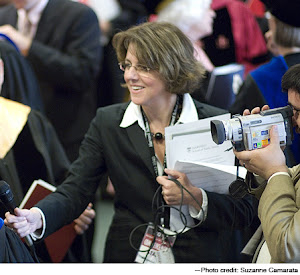Yes, prize-winning girls in science (see previous blog post), but then what? MIT and its female president, Susan Hockfield, had to cope with some awkward publicity today in The Boston Globe. Headline: Tenure at MIT: Still Largely a Male Domain It described how a photo gallery in last month's in-house newsletter Tech Talk showing recent faculty tenure appointments had caused much visceral discomfort. According to the Globe article, of the 25 smiling photos, only one was a woman. Awkwardness comes from MIT's very public 10-year plan to improve the gender ratio in the historically male-dominated university, an effort prompted by Prof. Nancy Hopkins' landmark report in 1999 cataloging how MIT "underpaid, marginalized, and disrespected female faculty in numerous ways, including providing less lab and office space and giving them scant representation on hiring and funding committees." [Globe description]
I went to the Tech Talk site and found instead a Nov. 14 article and photo gallery of 50 recent tenured faculty of whom six were women. As the lineup scrolls down, the visceral effect is nearly the same (try it). Hopkins told The Globe: "It's a shock. I don't have a thousand words as good as that picture. It's a good reminder. We learned a lot about this problem, but good will and time do not solve that problem."
A barrier-breaking generation gives context to contemporary female life.
Thursday, December 6, 2007
Tuesday, December 4, 2007
Girls Do Science, What a Crazy Idea
 Girls swept the top prizes for the first time at the most prestigious high school science competition, the Siemens Competition in Math, Science and Technology. The NYTimes reporting on the awards, which were announced yesterday, went straight to the person you'd want to hear from on this occasion -- Prof. Nancy Hopkins, the biologist at MIT who had walked out in disgust on a talk by Harvard President Larry Summers two years ago when he opined that "issues of intrinsic aptitude" might account for fewer women than men succeeding in math and science careers. Hopkins told The Times she couldn't honestly say it was shocking that girls would win a science competition. Then she had a great quote: “Why do people think girls can’t do science? Where did this crazy idea ever come from?”
Girls swept the top prizes for the first time at the most prestigious high school science competition, the Siemens Competition in Math, Science and Technology. The NYTimes reporting on the awards, which were announced yesterday, went straight to the person you'd want to hear from on this occasion -- Prof. Nancy Hopkins, the biologist at MIT who had walked out in disgust on a talk by Harvard President Larry Summers two years ago when he opined that "issues of intrinsic aptitude" might account for fewer women than men succeeding in math and science careers. Hopkins told The Times she couldn't honestly say it was shocking that girls would win a science competition. Then she had a great quote: “Why do people think girls can’t do science? Where did this crazy idea ever come from?”Summers, you may have heard, is ex-Harvard president now, his resignation following a cascade of events that were set in motion by that gaffe and by Hopkins' pointed protest.
Subscribe to:
Comments (Atom)


